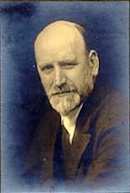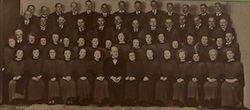A lecture by Hugh Roberton, conductor of the Glasgow Orpheus Choir, from 1912.
As we come marching, marching, in the beauty of the day,
A million darkened kitchens, a thousand mill lofts gray
Are touched with all the radiance that a sudden sun discloses
For the people hear us singing: Bread and Roses, Bread and Roses!Our lives shall not be sweated from birth until life closes –
Hearts starve as well as bodies: Give us Bread – but give us Roses!James Oppenheim
Bread and roses. A strange combination but a fitting one. We must have bread. We must also have roses. The word ‘roses’ is, of course, used to signify the joys of life: life’s efflorescence. Music is one of life’s greatest and grandest joys, the fairest of all the flowers of emotion, fairest and best; a language transcending speech and sublimating all that is most beautiful in life. In some form or other it exists wherever the hearts of men and women beat, or better still, wherever the hearts of men and women feel. It is an offspring of love, a striving after form and beauty of expression…
Truly, music has a democratic meaning. It springs direct from feeling, and in its highest form suffers no modification of its original impulse… Technique of a high order is demanded of the music maker of today, but the impulse must be an old one, must be the original one: must be feeling. And all the technique in the world will not save the man who lacks a sensitive heart, out of which feeling springs. “Give us Bread, but give us Roses.”
Democracy is perhaps too busy crying for bread to think of roses, but democracy will need to cry for roses, too; for the soul of democracy must be fed as well as the body. And democracy has a right to cry for roses; wherefore I hail James Oppenheim’s little poem with gladness.
The affinity of music with democracy
What more particularly can be said for an affinity between music and democracy? I answer that by asking another question. What true affinity has music with aught else but democracy? I admit there are false affinities – patronage, monetary support, etc. – but these are simply due to the state of society in which we live. They cannot be regarded seriously except by persons who think that our present civilisation is the best type the world will ever attain. Not admitting that, I again put the question: what affinity has music with aught else but democracy and, for that matter, what affinity has art in general with aught else but democracy?
In the term democracy I include all men and women who work either by hand or brain for what they legitimately consume. I exclude, as having no definite influence on art, the parasite class… The top dog is more to be blamed than pitied: the bottom dog to be pitied than blamed; a difference, mark you, which makes the bottom dog of greater subjective interest musically than the top dog can ever be, so true that feeling and music are interwoven.
Having defined democracy in a broad way, let me say first that, in tracing a musical affinity, that art draws its finest inspiration from the humblest subjects. It is a mirror reflecting life, the joys and sorrows and despairings and heart yearnings of humanity, and the units of humanity who matter are they who work and strive and live close to nature and true to their natural selves.
In that way the humblest shepherd’s cottage on the hillside is of greater virtue in the eyes of an artist that the imposing mansion of a millionaire. So with music. You can find no music inspired by the sight of a lap-dog in m’lady’s landau. We are still waiting for the symphony which reflects the glory of a ducal garden party…
The roses of music grew straight out of the hearts of men, and are drenched in the tears of humanity. It is thus that music humanises. Thus are musicians idealists; thus are they dreamers of dreams; thus are they rebels; and all because they are devotees of an art which has the effect of quickening sympathy and love. And if the art of music does not quicken sympathy and sensitive feeling, then its great lesson is lost…
Modern music originated in the church, it had a lowly origin. It had its first impulse from the adoration by men of one who was a certain carpenter in Nazareth; one of the common people whose associates, if history be right, were working men. And this carpenter was put to death because he was a rebel, because he rebelled against the law as it then stood.
The first great musical worker was Johann Sebastian Bach; a striking contradiction of the stupid theory that man will only do his best under the incentive of gain. Bach wrought out his great creations like a diligent workman without thought of gain or immortal glory; he was a poor man and a democrat. Riches were nought to him. He had his work to do. He did it: and not that way lay worldly gain. But Bach was not exceptional. No great composer ever penned an immortal bar under the incentive of gain. No enduring work of art can be produced in that way. And that is why the life stories of our great composers are so sad. Nearly all are stories of struggle, of penury, of revolt, of genius bleeding, but of genius triumphing over circumstances and convention.
Mozart was buried in a pauper’s grave; at least his body was. A thankless age could not bury the man’s great spirit. It lives with us today. Beethoven’s whole life was that of a man, face-fronted, standing up, defying conventions and rules, and mocking at the affectations of his age. He was a man democratic to the core… Hence musicians have in the main been rebels, and the greatest musicians have often been the greatest rebels… Musical progress and social progress equally demand a fair field and no favour, equally demand the overthrow of the false money standard by which men are too frequently judged…
Going over the list of musical geniuses we find their fathers occupying such high stations in life as the following: upholsterer, forester, wheelwright, soldier, schoolmaster, boarding-house keeper, bookseller, country inn keeper, surgeon, violinist, and clerk. We cannot find a single case of aristocratic or opulent people producing a musical genius… Musical roses can only be produced from the natural soil, from the living, seething life itself. The idle rich do not hold the destiny of music in the hollow of their hands.
The gulf between music and democracy
It will be said, and with some truth, that there is a great gulf between the ordinary musician of accomplishment and the ordinary member of democracy. My dear friends, so long as economic conditions impose on men and women frightful and grinding and unceasing toil, so long will democracy be kept out of its full musical heritage. Music demands leisure and environment. These have been denied.
Do not think for a moment that the only geniuses whose names live, are the only geniuses who ever came to this planet. Commercial slavery has chilled and killed the souls and bodies of countless numbers of potentially great men. The wonder is that democracy, such as it has been – hewers of wood and drawers of water – should be able to show a single flower. “Bread and Roses!” Ay, many, many thousands of roses have been crushed and stifled in the struggle for bread…
Genius will continue to be stifled and sacrificed till the world learns wisdom; till the face of civilisation is turned toward the golden era of fraternity and freedom. It is coming. The homage to kings – monarchical and commercial – to stock jobbers and speculators and merciless traders, is passing.
A fine instance of how social conditions may stifle genius is seen in the case of women. We have no female Beethovens or Wagners. Why? We may be told it is because women are not organically fitted to express themselves in exalted ways. Ye gods! Who shall say that women have, in the main, been free to express themselves in any way apart from grinding toil. They have been the slaves of men generation after generation: and men know it. They have given in return love and unremitting service which men will never repay. Their work has been onerous, constant, and oftentimes degrading… Women have been the white slaves of history, and slavery is the poorest kind of bed in which to rear the flowers of culture.
In every sphere where women have been allowed freedom of action they have taken their place alongside men, inferior in little but brute strength, and superior in many things. In vocal music women are as good as men… Women make the finest, quickest, and most intelligent choristers. Their loyalty, their nobility, and their great spirit is above all praise…
Democracy active in music
I wish now to direct your attention to a musical movement where democracy has asserted its undoubted supremacy. Some years ago, Sir Edward Elgar stated that the centre of musical England was not in London – it was further north. To what did he refer? He referred to the competitive festival movement, a great movement, a democratic movement, and a movement out of which has grown the finest choral singing ever known. He referred to artisans and millworkers of Lancashire and Yorkshire. No one who ever heard those wonderful choirs sing could avoid being struck and thrilled by such magnificent art.
All the money in the world could not of itself create such art. It is not a purchaseable thing. It comes straight out of the hearts of men and women whose feelings have not been lost in the smoke of artificial respectability. It is art. It is the grandest and noblest feature of present-day music. It has inspired our fine band of contemporary British composers to write music which would never have been written without this democratic impetus.
The idle classes have played with music, concealing their yawns behind their painted fans. The democrats have done it. Speaking recently in Glasgow on this topic, Mr Granville Bantock, the eminent composer, said that the hope of music lay in its being firmly rooted in democracy. And Elgar and Bantock ought to know. Bread and roses, friends. As Ruskin says, “Wherever the faculties of man are at their fullness they must express themselves by art.”
Ideal democracy
Finally, let me direct your attention to what I consider an ideal democracy. Such a thing is actually wherever a good choir raises its head. A successful choir must have an ideal, a common cause. The members must be united in pursuit of that ideal. Disunite them, split them into battling factions, as our political parties are split, and all the king’s horses and all the king’s men will never bind them together again. Unite them, however, as they are united in the English artisan choirs – and as they are united, to some extent north of the Tweed – and you see glowing power for good of a democracy rightly developed.
Such societies have no room for drones or idlers. Every unit must be a working unit, each for all and all for each – blending, harmonising, moving together en masse. No shouting down, no loud-mouthed self-seekers, no class distinctions, no affectations. Truly, the ideal democracy
The real chorister is prepared to serve and to subordinate; to merge his individuality for the common good, and thus to raise the common standard. I am simple enough to believe that what can be attained in the government of a choir can be attained in the government of a country. It may be a dream, but I would rather dream that dream than be a party, through mental apathy, to the perpetuation of this nightmare. And let us not forget that life to many is little better than a nightmare…
Democracy began by demanding bread. Democracy has a full right to share in the roses. Music is a fair rose, and you will never raise a people to a high state of civilisation and culture without its fragrant and sweetening aid… I believe the sweetest songs have yet to be written; the greatest symphonies have yet to be penned; the greatest tone-poems yet to be conceived. Sorrow has been the prevailing note in music so far, because sorrow is the prevailing note in the world. To think is to be sorrowful. And much of the sorrow is preventable; its cause economic; its origin, misery…
The new age will be to music as sunlight is to flowers… When the nation is as careful of her children as she is of her property; when a starving child is unknown; when women are truly the companions of men; when the homes of men and women are homes where men and women should dwell; when luxury and the lust that comes with luxury are abolished; when worldly self-seeking ceases to be applauded; when men are helpful – not hurtful – to their brothers; each for all and all for each; then will be the golden age of democracy, then will be the golden age of music:
Hearts starve as well as bodies;
Give us bread – but give us Roses!
—-
This is an edited version of a lecture Hugh Roberton gave in the Metropole Theatre, Glasgow, in December 1912, organised by the ILP.



1 November 2013
[…] see ‘Music and Democracy’, by Hugh Roberton, a lecture organised by the ILP in December […]